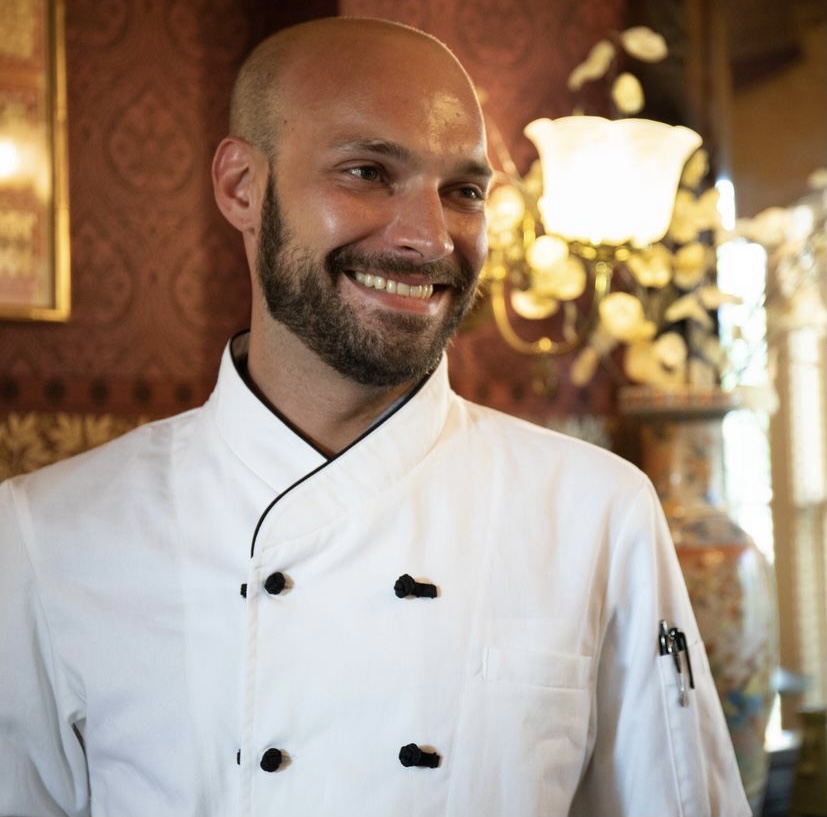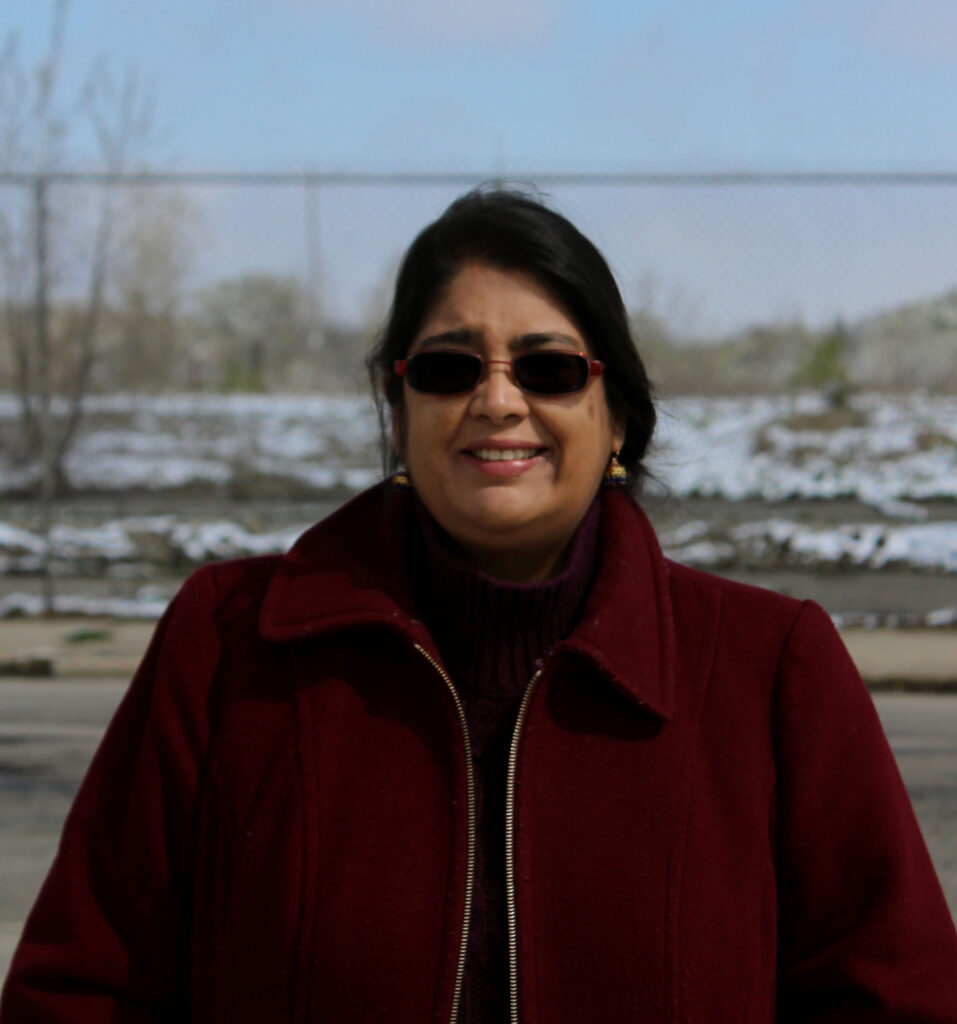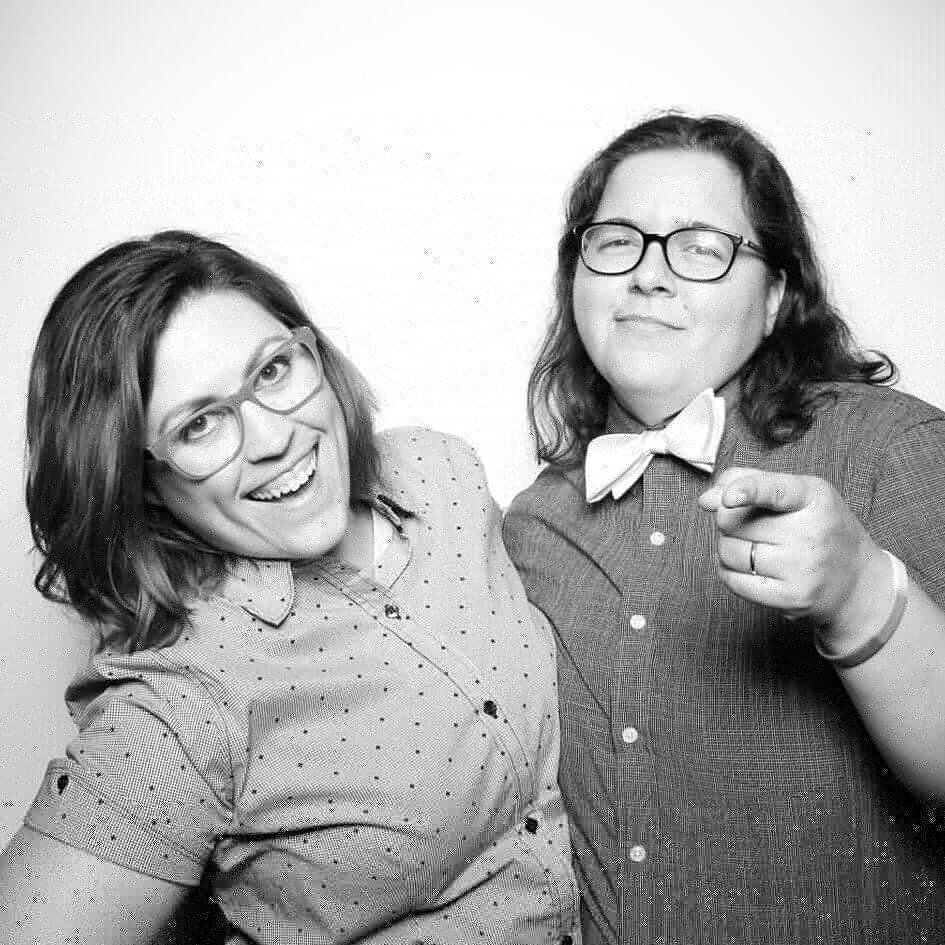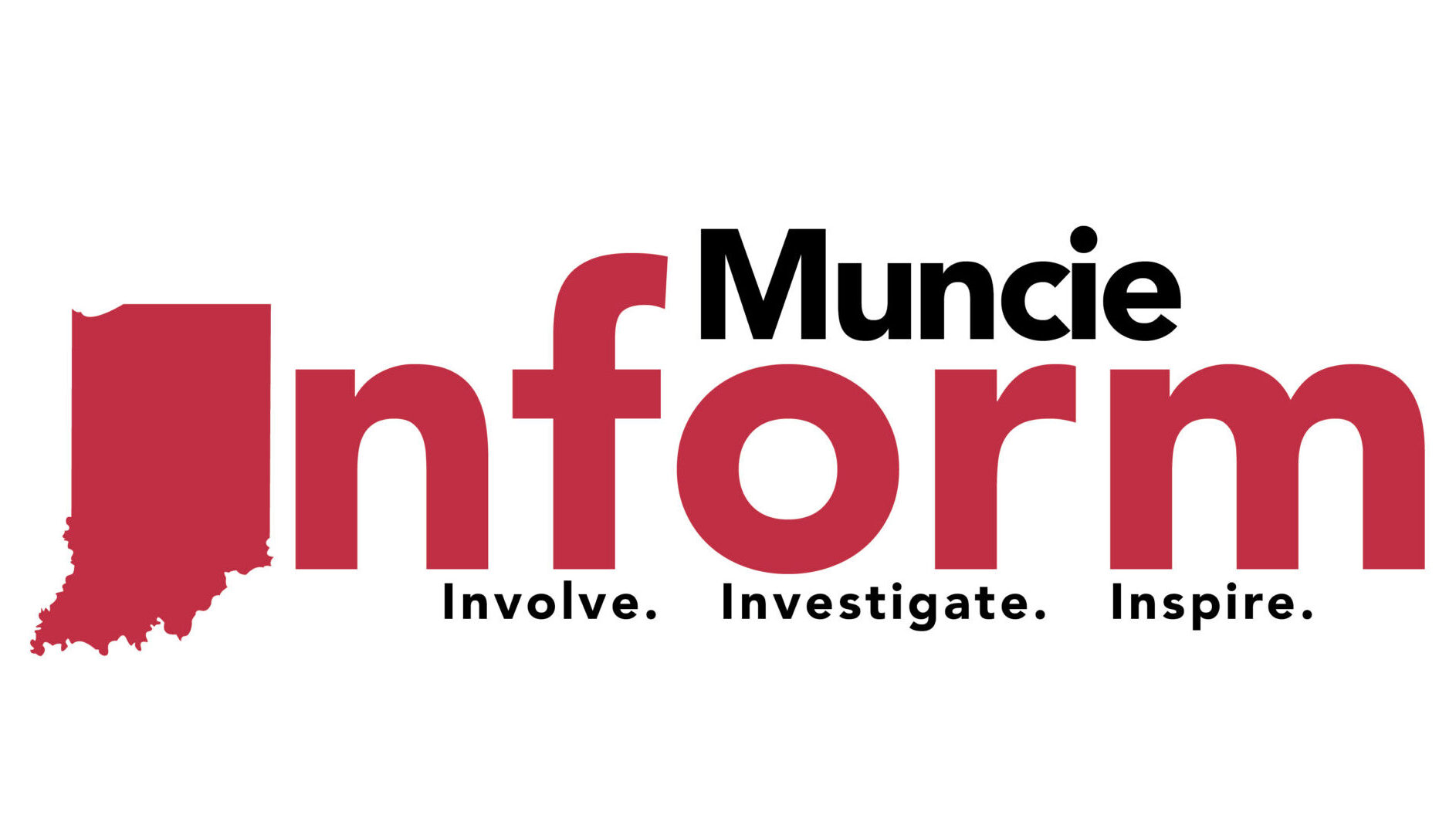
Hayden Emrah: All right, I’m Hayden with Inform Muncie, and today I’m joined here with Nicholas Kirkpatrick, head chef at The Neely House, one of Muncie’s premier dining restaurants. Um, just give us a little bit background yourself, and we’ll go from there.
Chef Nicholas Kirkpatrick: Okay. Well, I’m the Executive Chef, uh, owner, as of last September. I helped start the project about three years ago. And, yeah, I’ve been in restaurants for, gosh, over 15 years now.
Hayden Emrah: Good. Good. All right. Well, I mean, might as well jump into a little bit of background about the Neely house, you talked about you started a project in 2017. Maybe touch a little bit on who Thomas Neely was. I know he’s a pioneer in the Muncie area, but what does that actually entail?
Chef Nicholas Kirkpatrick: So, he helped a lot with you know, putting Muncie on the map. He helped bring railroads to Muncie, which we all know how the railroads are now. It’s been a huge help for that. But he was one of the pioneers of the city. What was so interesting about him is he dared, daily, almost, about his life, what they ate, what they grew on the property. So that really gives us connection to Thomas nearly this was a house that he originally built in 1852. And it was just the very, like, front third of the house. Originally, he slowly added on through the beginning of the 1900s. It’s just that connection to an older time really.
Hayden Emrah: Yeah, I guess that it kind of brings into like a deeper question. You know, a lot of restaurants like especially like, say, Starbucks, whatever. It’s like they serve, you know, ground coffee juice or whatever. That’s not- subpar. But the atmosphere is good. Yeah. Do you feel like there’s a balance a restaurant needs to achieve between the atmosphere and the cuisine itself?
Chef Nicholas Kirkpatrick: Oh, absolutely. I mean, people eat with their eyes, I’m sure you’ve heard that, that it’s very much true, I mean, the ambience will affect the meal, the meal will affect the ambience, it goes very hand in hand. So like we have a beautiful dining room and exceptional food. Which we also do try to sustain, you know, as low as we can. But and just the highest quality product available.
Hayden Emrah: And yeah, it actually brings me to my next question about some of the community aspects. I know your website talks about being locally oriented, trying to get local food much as possible. Yeah, some of the specific ways that you do that,
Chef Nicholas Kirkpatrick: I’ve got a couple things going on, which I’ll tell you about. But we work with First Fruits Family Farms. They’re local, I think they’re in Anderson, it’s super close. But they do all pasture raised. All-natural pork, chicken, beef. So we’ve done a beef broth and a chicken broth with their local products, which is selling pretty well. And then we’ve also expanded we’re trying out pulled pork, and we’ve also rendered their lard. So I mean it’s super local, it’s like I said, All natural pasteurized, they’re really good products. You know, it’s a, that’s more that goes beyond the restaurant, it’s, you know, something most restaurants don’t usually do, but we’re crossing to help these local, you know, our local farmers, which in turn helps us. We’re working with a local church, for a youth group to help cultivate our gardens. They’re looking at inner city dining here, sorry, inner city farming. Throughout, you know, the historic districts in Muncie, there’s a space available. But that’s one thing we’re really excited about. I am for one, to have help out with the gardening because it’s pain by myself. But just the outreach, you’re going to have it so these kids can, you know, have something to do over the summer, or, you know, on weekends, learn things grow, and yeah, turn it into food that we’re producing. And it’s just really interesting. So we’re excited to start on that project or move forward with that.
Hayden Emrah: Yeah, sounds awesome. Yeah. And shows a real commitment to the community. And you know, what you’re doing here, especially bringing back a such historical aspect of Muncie to fruition again. Um, I guess that brings us to the some of the, you know, when people think Delaware or Delaware County, Muncie specifically, they think you know, all the bar fees like chollas, or Greek pizzeria. How do you feel that you’re, you’re fitting into, you know, make a new name for monkey when it comes to fine dining cuisine?
Chef Nicholas Kirkpatrick: Fine dining, really, there’s a very small handful of restaurants in Muncie. Which is sad. I mean, because they’re just so you go to McGalliard and you see all the corporate? Yeah. Yeah, there’s really- I think we’re making good name for ourselves. A lot of people are hearing about us. I think we’re filling a gap that Muncie needs.
Hayden Emrah: That’s awesome. I’m glad to hear you’re doing such good work for the community. And you know, you’re putting on [programs] where you’re literally feeding the community. I mean, where would you like to see yourself, and The Neely House, you know, a couple years down the line in terms of like, community outreach, you know, stuff like that if you could really [elaborate], assuming everything goes well, there’s not another global pandemic,
Chef Nicholas Kirkpatrick: Haha, right? Um, you know, we’re doing what we can. And really just with our success through the pandemic, we did take a little break, but uh, getting back to normal operating, we’re we’d like to help out as much as we can, we do donate to IPR and a few other organizations, and you know, we’ll take it from there. We’ll see what opportunities present themselves to us.
Hayden Emrah: Awesome. Yeah, rebuilding your brand awareness. Trying to get out there again, make sure people know your name. It’s great.
Chef Nicholas Kirkpatrick: No, that was awesome. Yeah, well, hey, I appreciate it Hayden.
Hayden Emrah: Appreciate it too. Yeah, well have a good one Nick. Is there anything you’d like to plug or add at the last minute? I mean, people want to check out your website of course and social media.
Chef Nicholas Kirkpatrick: Yeah, we’re always putting new stuff new menu updates on Facebook, The Neely House or our website. I try to keep up on that best I can, TheNeelyHouse.com Yeah, I mean for reservations, carry out we’re all here. And they can get at me through the website if anyone’s interested. Awesome. Awesome.
Hayden Emrah: Thank you for your time, it was good to talk to you.
Chef Nicholas Kirkpatrick: Cool. Appreciate it Hayden, have a good day.
Hayden Emrah: You too.

Jacqueline Hanoman: The solar farm is an issue of contention in our community, mainly because we cannot visualize what is this going to look like, and how is it going to benefit our community. I think the main concern for the neighbors is how is it going to benefit the community.
Samantha Nower: That’s Jaqueline Hanoman, executive director of the Ross Community Center on 10th street. She’s talking about the new proposed solar panel farm on 8th street, aka the site of the old General Motors factory. Mayor Dan Ridenour announced the project earlier this year, with plans to sell the solar energy to American electric power.
Jacqueline Hanoman: Mainly people are concerned about what is the benefit. On the other hand, right now there is absolutely no benefit to having the brownfield, except an empty place that looks horrible. So it’s a very multi-dimensional issue. On the one hand, how does it benefit the community? How does it benefit the city? On the other hand, we have these fields that are doing nothing right now. So do we go forward with a solar farm? Which is the only project that’s there.
Brian Carless: I think the overwhelming voice of the neighborhood is like ‘if you’re going to build a solar panel, it’s got to have something that beautifies the neighborhood.’ Cause the areas already pretty- it’s not that hopeful when you look at it and drive past it. And there’s big fences and there’s barbed wire and it’s just vacant concrete with trees popping out of it. It looks like it doesn’t belong there. So if there’s a way to do development and make that pretty and make it something appealing to the neighborhood, that’s definitely what the residents are saying.
Samantha Nower: That’s Brian Carless, Muncie resident and member of the Thomas Park Avondale Neighborhood Association, home to the old GM site.
Brian Carless: I’m very interested in this project, but I think that if we can work together with the project and the neighborhood to kind of create some sort of conglomerate or some sort of partnership, it could be a pretty cool project.
Jacqueline Hanoman: I think a solar farm would be interesting. I think it would be good for the neighborhood. I also think that we have to create, we have to make it a beautiful space. So what about if the solar farm was inside but on the street, right away around we have beautiful trees? I just came from a meeting where we talked about what if you had murals that talked about the history of the community?
Samantha Nower: Ridenour said there are plans to beautify the site with a walking path and a section devoted to the history of the former Chevrolet Plant. The plan is just one of Ridenour’s plans to make Muncie a greener city. Both Hanoman and Carless are in favor of this new direction.
Jacqueline Hanoman: I think it will be successful if he gets the community engagement. I think it will be. I think, I do unfortunately believe that there will be challenges, and I think he’s already seen some of those challenges, but I think yes, I think it is, it’s going to be successful. We just have to find way to engage in community.
Brian Carless: I’m really excited about the push to do solar here in the city of Muncie.
Samantha Nower: For Inform Muncie, I’m Samantha Nower.

Morgan Roddy: Hi my name is Morgan and I use she/her/hers pronouns.
Cheri Madewell: I’m Cheri and I use she/her/hers pronouns. Yeah, I feel really lucky because I transitioned to a new job, a different job at the University, but I really embraced sort of being out and being open and being queer primarily because when I talk about my personal life it always includes my wife, Morgan, and I’m so proud of her in really owning this business Queer Chocolatier and so I have to talk about it’s my life, it’s who I am, and how do you say ‘my spouse owns Queer Chocolatier’ without really outing yourself. So, I wanted to have those conversations and I’m just lucky that you know they’ve really been embraced. I, also, understand a lot of privilege built into that. You know, being a white cisgender, you know, woman, who’s also in her 30s and in a space with other folks who are similar and look like her honestly and just also just that I’m outgoing and you know have a personality that is part of the majority. So, all of those things play a really significant role in my comfort level of being out and also just how I’m embraced by folks who I work with as well.
Morgan Roddy: And it’s just tough because in a workplace environment, people need to provide for their material livelihoods. People need jobs, people need to work, and if you’re applying for a job and you’re queer in some capacity, whether your sexual orientation or your gender identity and presentation, if you’re queer, you have to make a choice, whether consciously or not, to either hide part of yourself when you’re interviewing for a job in hopes of getting it, or you’re fully yourself and you’re risking either not getting the job, or once you do get the job, potentially facing some sort of discrimination or harassment once you’re in that workplace. So, it is really kind of a dangerous place to be a lot of times for queer folks looking for jobs because, again, homeless population is-we have a lot of queer folks that are overrepresented in the homeless population and a lot of us live below the poverty line and part of it is because of what it’s like to be queer and looking for work. And you know with Queer Chocolatier, it’s really interesting being in a workplace as a queer person but, actually being a queer business owner; because being in a college town, there’s a lot of people who are looking for jobs just all the time and I get that. But there was a period of time for, probably, I mean even into the pandemic, we would get at least one email a week, maybe through social media, through our website what have you, or even a phone call, or somebody would ask for whether or not we were hiring. And nine times out of ten, everybody who asked for a job mentioned their own queerness and they mentioned that they would really want to work for a place that is fully affirming to their identities and I was talking to Cheri about how much that really speaks to how hostile the other workplaces are that they feel like they have to lead with their queerness to kind of show that they are really needing a safe place to work. And it just made me think about how I was in my own workplace experience’s, not even that long ago, within the last 10 years, I worked for a fairly conservative organization in a small town and I was actually outed to my employer-my coworkers, without my knowledge, so that was fairly harassing and it kind of made for a hostile workplace. But then again, you know, that’s my own experience and it could have been a lot worse, but it just makes me think that having a queer owned business really does change the environment for the workplace for people in your community. And pronouns are really important. At Queer Chocolatier, here in Muncie, we have name tags that have pronouns on them for our employees to wear and it was Cheri’s idea to come up with those and I think she can tell you more about why those are really important in our workplace.
Cheri Madewell: Yeah, I just realized that folks in the service industry: waiting tables, coffee shops, cafes, often are misgendered and I just thought this would be a pretty normalizing way for folks to, you know, know right off the bat as a customer, you know, first of all just with their name is so they can address their name, but also feel comfortable using their pronouns and then it just started to open the door for us to have conversations about pronouns in general. So, it ended up just being a great place to have those discussions and make both our employees and customers just feel more comfortable in general.
Morgan Roddy: It really did and I think, like you said, it really opened up conversation because they were they were really good looking name tags, just for one, but also you could tell customers really were then having to face that question of ‘why is there a pronoun right in front of me?’ and then you could tell they were processing a lot of that information in real time and it did open up for a lot of conversations and I think that’s one of the favorite things that I have about Queer Chocolatier, it’s that it does open up for a lot of conversations.
Cheri Madewell: Yeah so, I loved the pronoun name badges we ended up using because we reached out to a local vendor in town and had some nice…what kind of material would you say the-
Morgan Roddy: -kind of like a magnetic-
Cheri Madewell: A magnetic clip, right. So, folks could leave it on the fridge at the end of the day. And also, if you ever notice folks/customers that come in that might say Ma’am and Sir that also reduced this. But we upped the game on the name tags, they looked good. But I ended up adopting name tags later in my own classroom when I was teaching at the University, so I found some “Hello my name is” that had pronouns built into it and it was just cool for students to opt into using the name tag. It was a gender studies course, so really appropriate conversation that came with that as well.
Morgan Roddy: Right on.
By Jacob Hale
Executive Director Ken Hudson says the Whitely Community Council has big plans for its building at Centennial Avenue and Dr. Martin Luther King Blvd., including creating space for a business incubator and health care clinic.
While the plans detailed for the building are wide in scope, each part will accomplish a goal addressing some of the more pressing issues in the area. The purpose is educational. It’s meant to give real world experience to people who want to start their own small business. This also works as an agent to inject small businesses into the Whitely neighborhood, Hudson said.
The warehouse was once home to a roofing supply company.
Accessible health care service is needed, too, Hudson said. The nearest location for healthcare services is the IU Ball Memorial Hospital, which is more than two miles away. Transportation also can be an issue, as many residents have limited options.
To learn more, watch “The Boot: A conversation with Ken Hudson”
